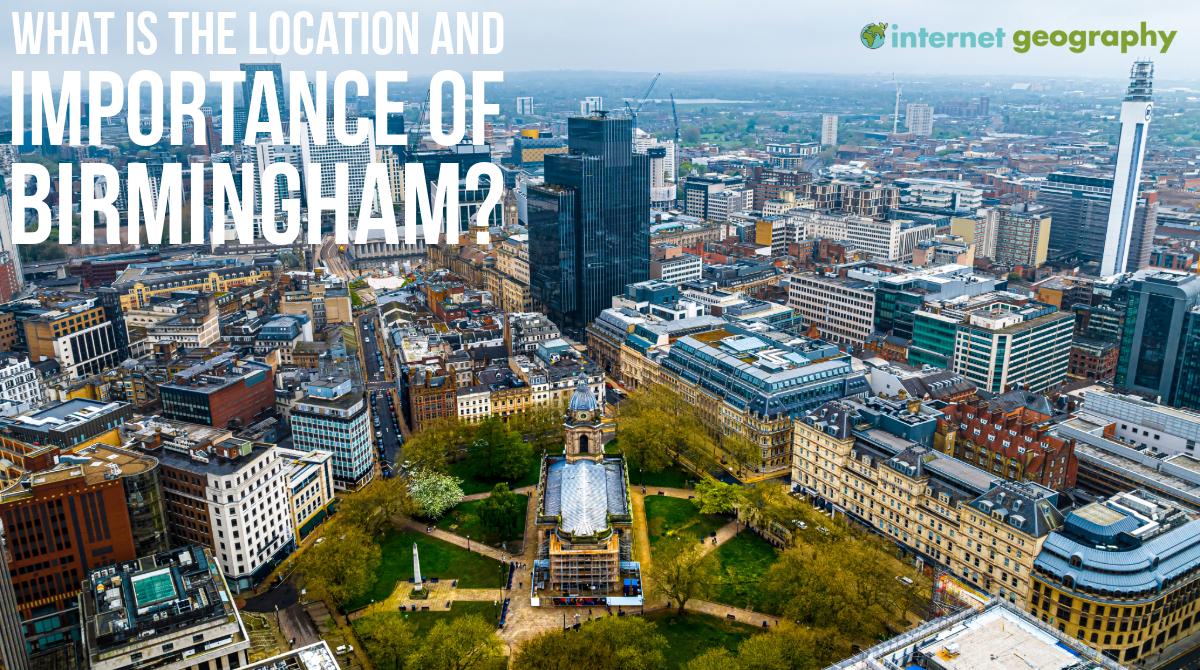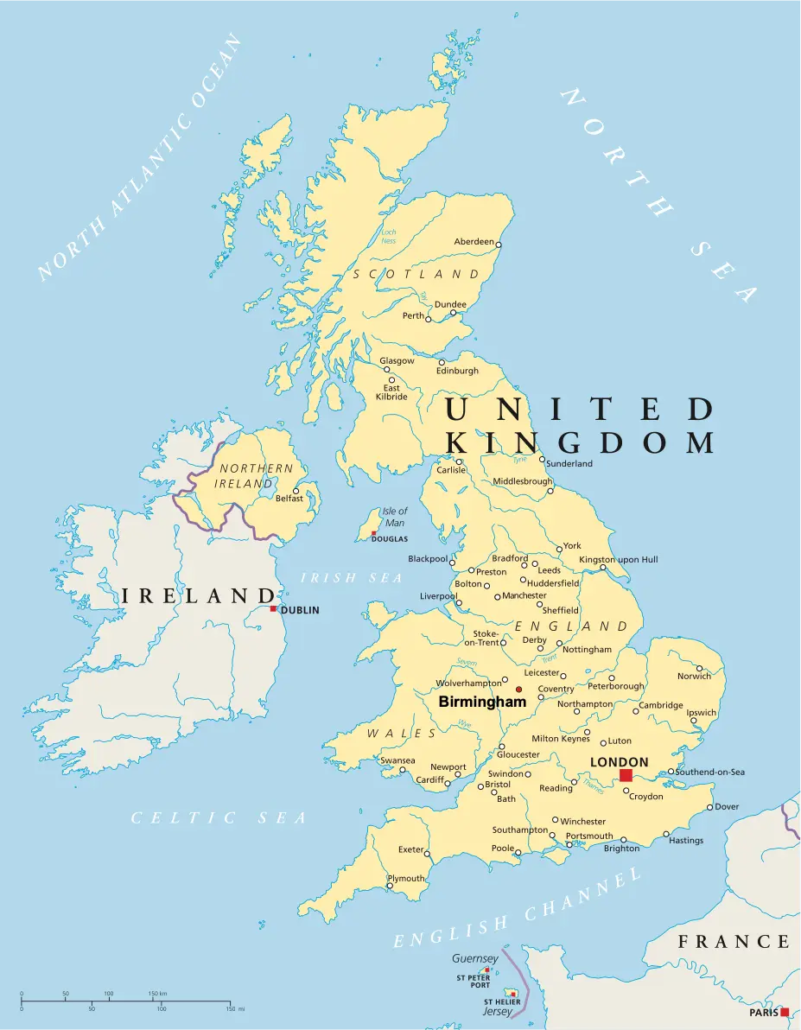What is the location of Birmingham?
Birmingham is located in the West Midlands region of central England. It lies roughly 100 miles (160 km) northwest of London and is positioned at the heart of the UK’s road and rail networks.
The city originally developed on a dry, south-facing sandstone ridge near a crossing point on the River Rea, offering early settlers a reliable water source and favourable transport routes.
Birmingham’s central location, close to natural resources like coal, iron ore, and timber, supported its growth during the Industrial Revolution. Historically, the city was not located on the main trade routes, with more important roads passing through nearby towns such as Coventry and Lichfield. However, it gained prominence by specialising in high-value, small-scale manufacturing such as jewellery, guns, and brassware—industries that relied more on skilled labour than heavy raw materials.
Birmingham’s expansion accelerated in the 19th century, especially with the development of its canal and railway networks. The city grew into a major industrial and commercial centre and is now the UK’s second-largest city by population.
What is the importance of Birmingham in the UK?
Economic importance: Birmingham plays a vital role in the UK economy. It is the largest city economy outside of London, contributing approximately £31.9 billion to the UK’s Gross Value Added (GVA) in 2022. The city has a strong financial, business services and digital technology sector. Birmingham’s economy is increasingly diversified, with growth in advanced manufacturing, life sciences, and creative industries.
Educational importance: Birmingham is home to five universities, including the University of Birmingham (a member of the Russell Group), Aston University, and Birmingham City University. Collectively, these universities attract over 80,000 students, helping to build a skilled workforce and contributing to the city’s economic and cultural life.
Transportation importance: Birmingham is one of the best-connected cities in the UK. It sits at the heart of the motorway network (M5, M6, M40, M42), has a major national rail hub at Birmingham New Street, and is served by Birmingham Airport, which offers flights to over 150 destinations. The city is also a key centre for freight and logistics. Birmingham will be the terminus of the new High Speed 2 (HS2) rail line, linking it to London with significantly reduced travel times. Although initially planned to extend further north, the northern section of HS2 has been cancelled, making Birmingham the final stop on the route.
Birmingham also has a rich transport history: the Birmingham Canal Navigations stretch over 100 miles—more than Venice—and played a critical role in the city’s industrial growth. The Grand Junction Canal (opened 1793) and the opening of the London to Birmingham Railway (1838) made Birmingham one of the first truly connected cities during the Industrial Revolution.
Cultural significance: Birmingham is a diverse and multicultural city renowned for its thriving arts, music, and food scene. The city hosted the 2022 Commonwealth Games, bringing global attention and over £1.2 billion in economic benefits. Birmingham is also renowned for the Birmingham Royal Ballet, Symphony Hall, and a range of music venues, including the O2 Academy and Resorts World Arena. Its multicultural communities have helped shape the city’s unique food identity, including the famous “Balti Triangle.”
BBC Three is relocating its headquarters to Birmingham, with plans to be based in The Tea Factory in Digbeth, further strengthening the city’s growing reputation as a national media hub.
Retail and leisure importance: The Bullring & Grand Central shopping complex is one of the most visited retail destinations in the UK. Birmingham’s city centre has undergone major regeneration, creating vibrant spaces for shopping, dining, and entertainment.
What is the importance of Birmingham in the wider world?
Economic importance: Birmingham is positioning itself as a global business destination. It has the largest professional and financial services hub outside London. It is home to international companies such as Deutsche Bank, HSBC UK (which relocated its UK headquarters to Birmingham), and PwC. The city also hosts the UK’s largest insurance market outside London.
The NEC (National Exhibition Centre) and ICC (International Convention Centre) attract international conferences, exhibitions, and trade events, generating billions of pounds for the regional economy.
Cultural importance: Birmingham has a global reputation for its music scene. It is the birthplace of heavy metal, with bands like Black Sabbath and Judas Priest emerging from the city. It also has a growing reputation in urban music and grime. The BBC has a significant presence in Birmingham, and the city’s multicultural population influences its diverse creative output.
In June 2025, Birmingham’s Jewellery Quarter was officially awarded World Craft City status, recognising its historic and ongoing significance as a centre of craftsmanship, creativity, and heritage.
Digbeth Loc. is a new state-of-the-art studio complex in Birmingham, where major national and international productions, including Peaky Blinders and MasterChef, are filmed.
Birmingham holds international sporting significance as the home of Edgbaston Cricket Ground, one of England’s key Test match venues and host to major international tournaments.
Environmental importance: Birmingham aims to become net zero by 2041 and is investing in green public transport, clean air initiatives, and low-carbon technologies. Projects like the Birmingham Clean Air Zone (launched in 2021) are part of the city’s effort to reduce emissions and encourage sustainable travel.
Historical significance: During the Industrial Revolution, Birmingham gained a reputation as the “workshop of the world” due to its expertise in precision manufacturing. The city played a key role in shaping Britain’s industrial and economic history. It was also a centre for political and social reform, with figures like Joseph Chamberlain and the Lunar Society helping to influence national policy and innovation.


